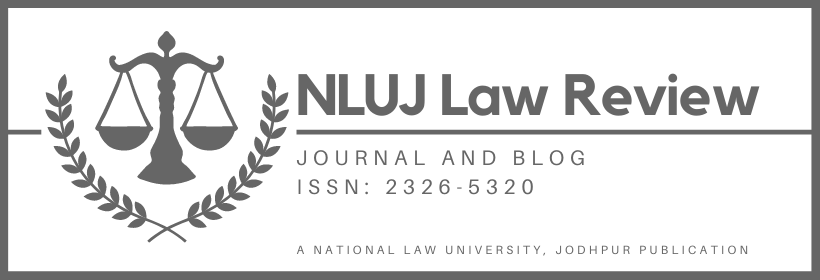Introduction: NCLAT’s order and locus standi
On May 29, 2020, the National Company Law Appellate Tribunal (“NCLAT”) through its order in the case of Samir Agrawal v. Competition Commission of India & Ors. laid down the meaning of ‘person’ as mentioned under Section 19(1)(a) of the Competition Act, 2002 (“Act”). This definition in the case led to an indirect demarcation of locus standi to approach Competition Commission of India (“Commission” or “CCI”) under the Act, which now means that it lies only with a person “who is either a consumer of the goods or services in question or a beneficiary of healthy competitive practices in a given market.” However, such narrowing down of the meaning has created wide unrest among the people in the legal fraternity as they believe that this order of NCLAT contravenes the spirit of the original 2007 amendment to the Act, through which the idea of ‘Complainant’ was replaced by that of an ‘Informant’. Back in 2007, while clarifying the reasons behind the amendment, it was stated that “an Informant may or may not have any personal interest or suffered any personal injury from the impugned anti-competitive conduct since such conduct is against the society in rem and it is the duty of every citizen to point out such illegal conduct to the Commission and the Commission is mandated to inquire into it if it finds that there exists a prima facie case to investigate.” This blog aims to analyse this recent decision of NCLAT.The blog will also attempt to arrive at the overall validity of such order through a thorough analysis of pre-existing notions – both, doctrinal and practical – while simultaneously testing them on the touchstone of judicial precedents.
Uber and Ola anti-trust case: Changing contours of locus standi
Mr. Samir Agrawal, an independent law practitioner, filed information with the Commission alleging a contravention of Section 3 of the Act which deals with anti-competitive agreements. The Informant alleged that the companies in question fixed pricing, which was applicable to all taxi drivers, and provided no price-determining independence to cab-drivers. This in turn led to the elimination of competition in the online cab service industry. However, the Commission found no substance in the allegations as it believed that there existed no prima facie evidence that there was collusion between the companies, and as the pricing was decided by an algorithm there was no question of anti-competitive activities. Therefore, as per the powers conferred under Section 26(2) of the Act, the Commission vide its order dated 06.11.2018 closed the case. The Informant, being aggrieved by the Commission’s decision filed an appeal before the NCLAT.
The NCLAT while trying to adjudicate on the right of an Informant to approach the Commission, interpreted the provisions under Section 19(1)(a) of the Act which reads as: “The Commission may inquire into any alleged contravention of the provisions contained in subsection (1) of section 3 or sub-section (1) of section 4 either on its own motion or on receipt of any information, in such manner and accompanied by such fee as may be determined by regulations, from any person, consumer or their association or trade association;” and held that ‘person’ would mean “a person who had suffered an invasion of his legal rights as a consumer or beneficiary of healthy competitive practices.” Justifying its interpretation, NCLAT said that any other broader interpretation would make “room for unscrupulous people to rake issues of anti-competitive agreement or abuse of dominant position targeting some enterprises with oblique motives.”
The Competition Act: Analysing the legislative and judicial interpretations
The Act opens the door for the establishment of the Commission to act as a watchdog and prevent any anti-competitive practices in the free Indian economy. The aim behind the enactment of this Act is laid out clearly under Section 18 of the Act which entrusts the Commission with a duty to “eliminate practices having an adverse effect on competition, promote and sustain competition, protect the interests of the consumers, and ensure freedom of trade carried on by other participants, in markets in India.” In order to facilitate the achievement of such objectives by the Commission, Section 19(1)(a) of the Act laid down three modes to take cognizance of a matter. The term ‘any person’ under Section 19(1)(a) of the Act, if interpreted literally requires no necessary nexus between the accused and an informat being directly affected by the subject matter of dispute in order to provide a valid locus standi to approach the Commission.
In fact, what needs to be kept in mind is that Section 19(1) of the Act was amended in 2007 and the words “receipt of complaint” were replaced by “receipt of information”. The amendment clearly hinted towards encouraging the public to bring to light any potential antitrust violation and help the Commission in the realization of its objectives. It also becomes pertinent to note the nature of proceedings are proceedings in rem and not proceedings in personam, thus indicating that the Commission is not concerned with the dispute between private parties. To avert frivolous cases, Section 45 of the Act grants the Commission powers to penalize informants who file false information or wilfully omit material facts or altered, suppressed, or destroyed any relevant documents, with a fine that may extend up to INR 1 crore.
When COMPAT (the predecessor of NCLAT)adjudicated on the issue of locus standi to approach the Commission in the case of Shri Surendra Prasad v. CCI, it tried to focus on the objective of the Act and the rationale behind taking cognizance for the Commission, and held that the plain language of Section 18 and 19 read with Section 26(1) of the Act fail to raise or bring to light any qualification or condition required to file information under Section 19(1)(a). Therefore, the requirement of the informant to have a personal interest in the matter was held not to be a prerequisite for a valid locus standi. The Supreme Court in CCI v. SAIL, while interpreting ‘any person’ under Section 53B of the Act noted that it needs to be construed liberally because of the framework and objective that the Act sought to achieve. Moreover, in the case of Shri Saurabh Tripathy v. Great Eastern Energy Corporation Ltd., the Commission while dealing with the issue of locus standi held that the Act permitted any person to file information and need not be a suffering party from the alleged conduct in question. Further, in the case of Tara Chand v. Gram Panchayat Jhupa Khurd & Ors., the Supreme Court reiterated its stance and held that ‘any person’ must be interpreted as widely as possible and to such extents so as to include even those who are not mentioned explicitly in the Act.
Therefore, such a narrow interpretation by NCLAT in Samir Agrawal v. Competition Commission of India & Ors. is a violation of the interpretation principle which states that if the words of the statute are clear and unambiguous and the intent of the legislature is clear as well, the Court must apply the literal rule of interpretation and not change the interpretation. The precedents as well as the fact that the Commission in past has taken cognizance of anti-competitive practices prevalent in the market based on the information filed by people who were not a direct victim of the alleged conduct and has taken strict actions against such practices, fails to strike consonance with the NCLAT’s present stance.
Conclusion: Why a restrictive definition is unacceptable?
The present criticism that the NCLAT’s order has to face is in no way unjustified. Not only does narrowing down the meaning of ‘any person’ severely limits the rights of a common man to approach the Commission, it altogether defeats the very objective and purpose that the Act strives to achieve. Even though the intent behind narrowing down the scope was indeed bonafide, i.e., to cut down frivolous litigation, the remedy adopted is flawed. Such narrowing down of the interpretation will potentially act as a deterrent to the public-spirited individuals and organizations who work for the betterment of our nation and its economy. As it places a limitation, people will find ways to do things indirectly which they cannot do directly. Thus, the NCLAT’s assertion that a narrow interpretation would deter people from approaching the CCI with frivolous litigations is not only unreliable, but also fails to satisfy us towards a sure realization of the sought after goal without affecting the overall objective of the Act. A better approach towards solving the issue of frivolous litigation would have been setting up of pre-filing conditions and checks which would scrape off such cases even before they enter the hearing stage. It still remains to be seen whether the order will be challenged in the Supreme Court. Until then we can only hope that the NCLAT will reconsider its stance and make amends, for if not done timely it would be highly detrimental for the society’s power to rise against the anti-competitive practice of corporates.
This article has been authored Raj Shekhar, a student at National University of Study and Research in Law, and Shailee Mishra, a student at University of Allahabad.



